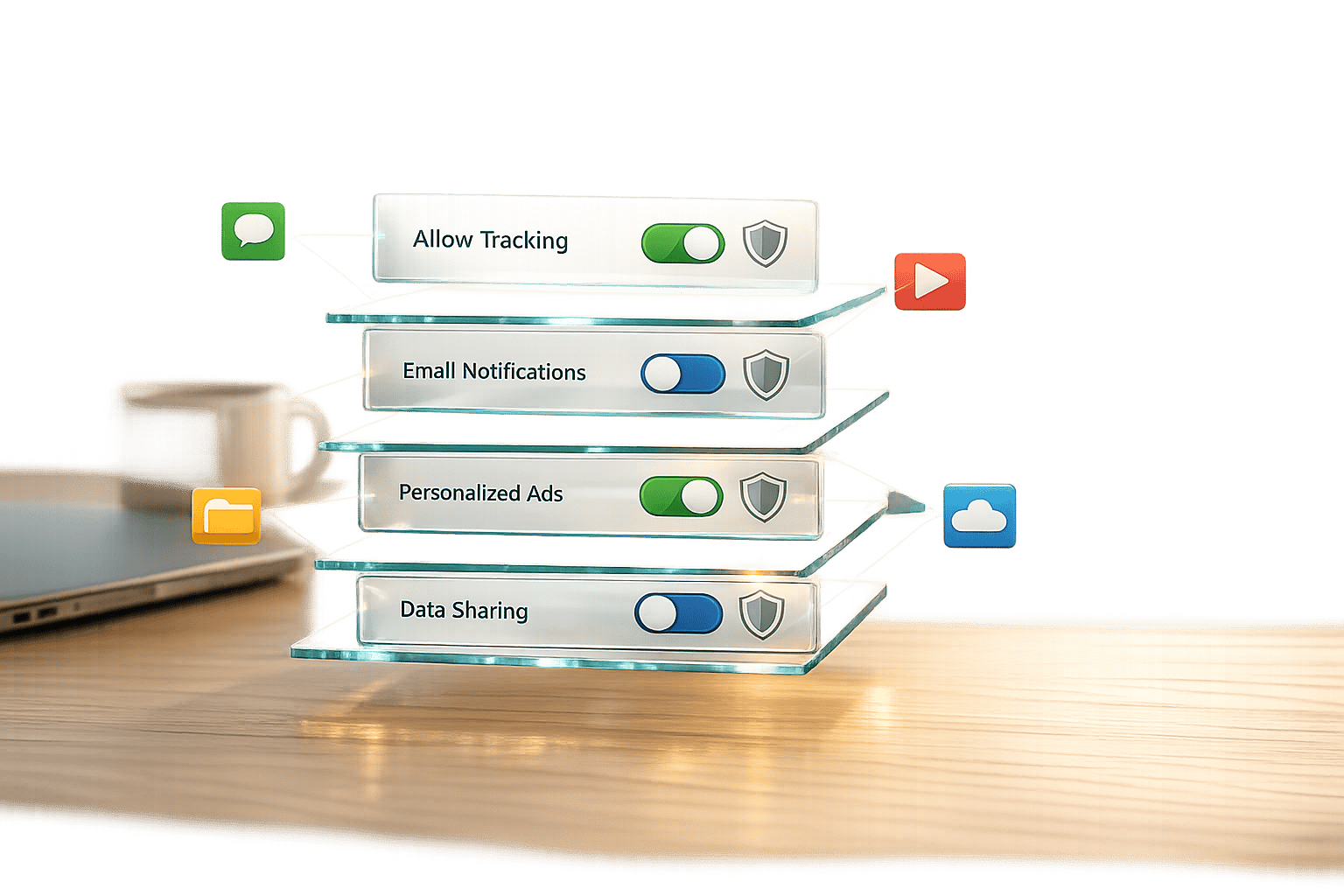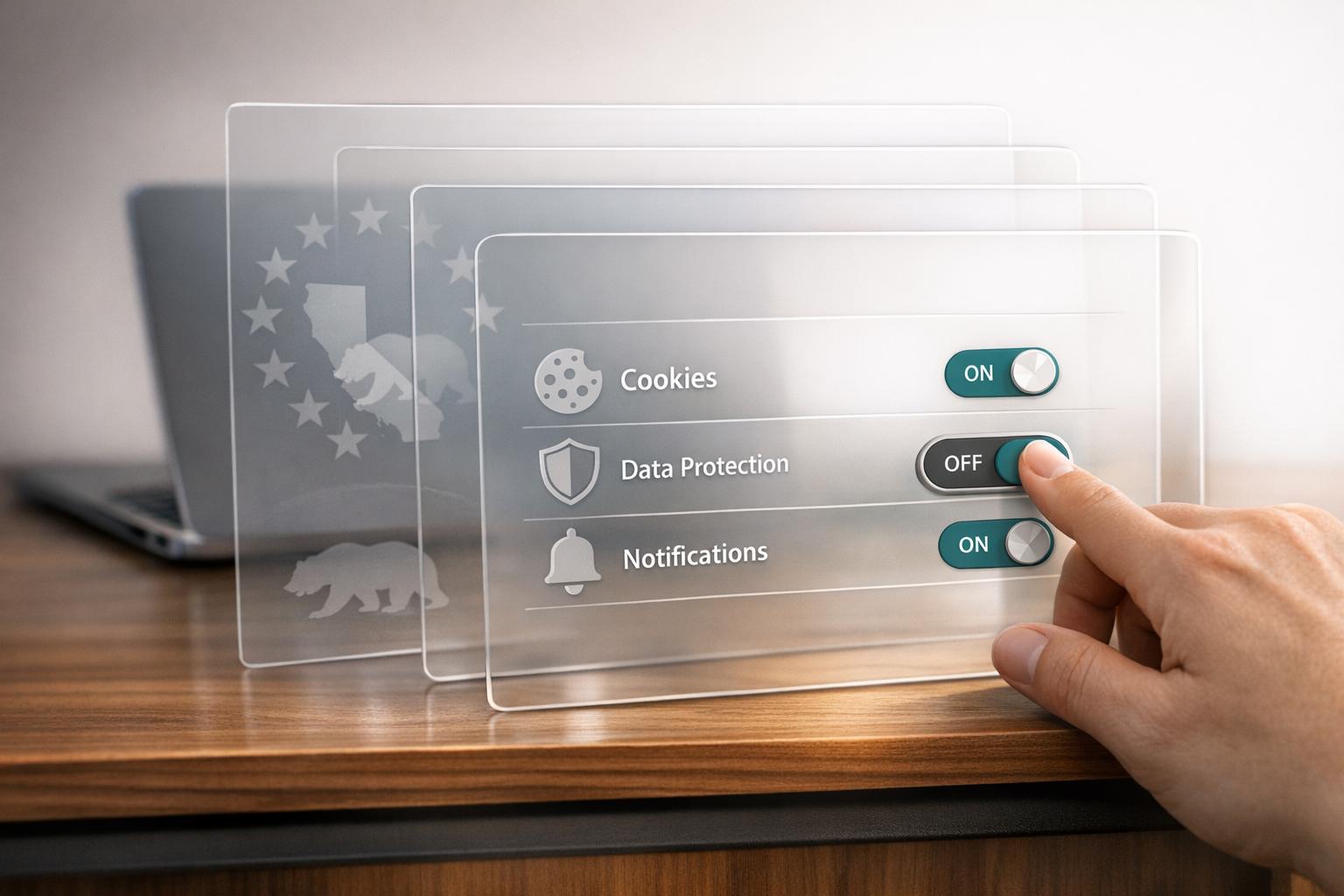Top 7 DPIA Tools for 2025
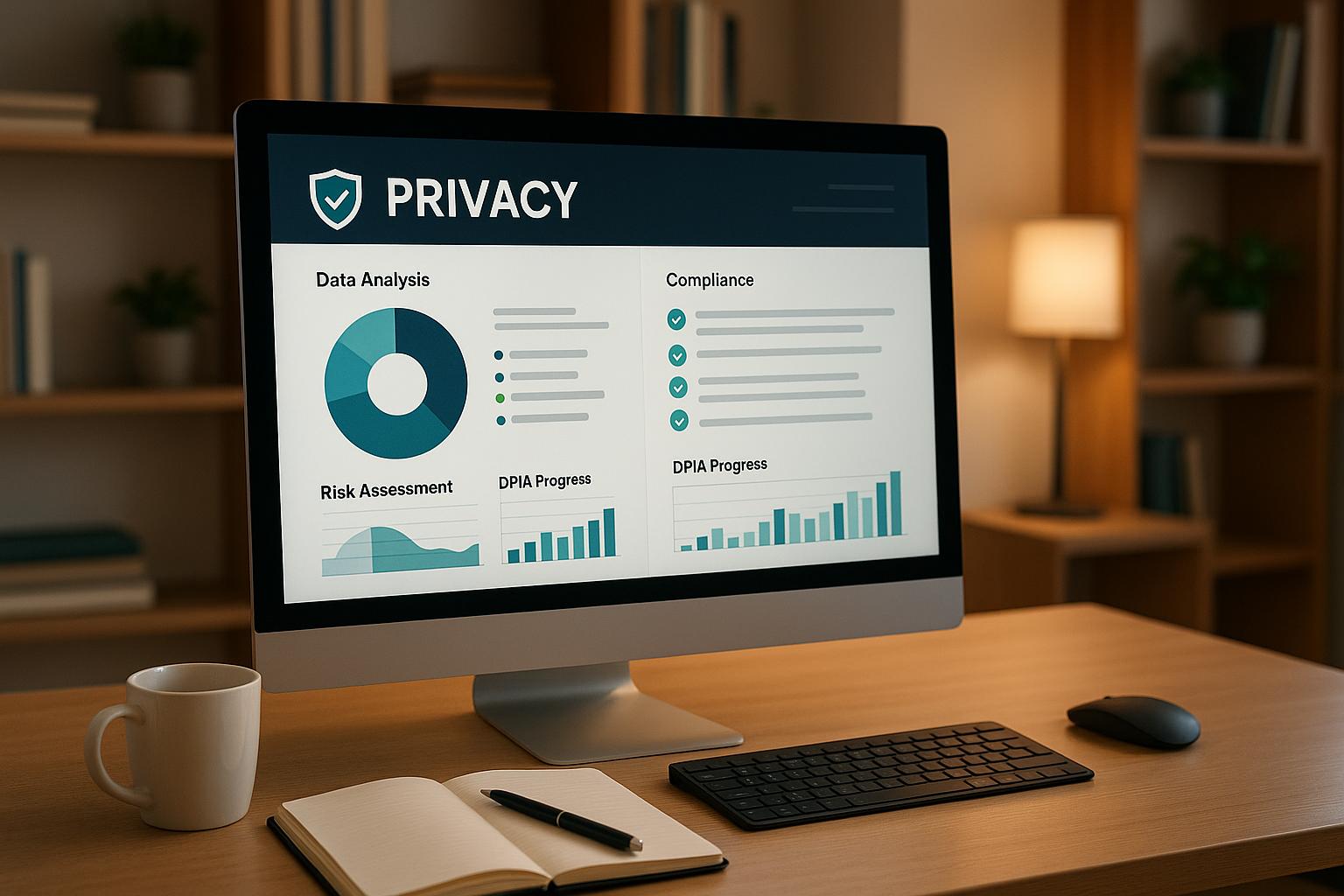
Data Protection Impact Assessments (DPIAs) are essential for privacy compliance in 2025. With stricter regulations like GDPR and increasing consumer privacy demands, organizations need efficient tools to manage risks and stay compliant. Below are the top 7 DPIA tools for 2025, their key features, and how they help streamline compliance:
Key Tools:
- OneTrust Privacy Automation - AI-driven risk assessment, multi-regulation compliance, and real-time updates.
- Vigilant Software DPIA Tool - Step-by-step guidance, templates, and collaborative workflows.
- TrustArc Assessment Manager - Automated risk scoring, multi-jurisdiction support, and seamless integration.
- Securiti AI-Powered Platform - AI for data discovery, classification, and compliance checks.
- Clarip Risk Intelligence - Predictive analytics, automated workflows, and vendor risk management.
- Mandatly Compliance Hub - Flexible templates, automated scoring, and multi-region compliance.
- Ketch Governance Suite - AI-powered mapping, real-time risk tracking, and strong security features.
Quick Comparison:
| Tool | Best For | Automation | Compliance Coverage | Key Features | Starting Price |
|---|---|---|---|---|---|
| OneTrust | Large enterprises | High | Multi-regulation | AI-driven workflows, templates | Tiered pricing |
| Vigilant Software | SMBs, simple needs | Moderate | GDPR-focused | Step-by-step guidance, templates | Affordable |
| TrustArc | Enterprises | High | Broad global support | Risk scoring, integration, updates | Custom pricing |
| Securiti | Data-heavy industries | High | 100+ regulations | AI-powered discovery, classification | $25,000/year |
| Clarip | Multi-industry compliance | Moderate | Major global regulations | Predictive analytics, vendor tools | $12,000/year (SMB) |
| Mandatly | Mid-sized businesses | High | Broad compliance | Real-time alerts, templates | Subscription-based |
| Ketch | Complex data environments | High | 30+ regulations | AI mapping, strong security | Tiered pricing |
These tools simplify DPIAs with automation, regulatory updates, and robust risk management features. Whether you're a small business or a global enterprise, choosing the right DPIA tool can save time, reduce risks, and ensure compliance with evolving privacy laws.
OneTrust PIA & DPIA Automation
1. OneTrust Privacy Automation
OneTrust Privacy Automation takes the complexity out of DPIAs by providing guided, automated workflows that break the process into easy-to-follow steps, making it accessible for organizations of any size.
With AI-powered machine learning, the platform identifies potential privacy risks based on assessment responses. At the same time, its natural language processing capabilities extract critical data, significantly cutting down on manual work.
To simplify compliance, OneTrust includes pre-built templates for key regulations such as GDPR (EU/UK), CCPA/CPRA (California), LGPD (Brazil), and PIPEDA (Canada). Its intelligent mapping feature allows a single assessment to evaluate compliance across multiple regulatory frameworks, making it easier for global organizations to manage their operations.
| Feature Category | Capabilities |
|---|---|
| Risk Assessment | • AI-driven risk identification • Automated scoring methodology |
| Workflow Management | • Customizable assessment routes • Stakeholder collaboration tools • Automated approval processes |
| Reporting | • Customizable report templates • Executive dashboards • Multi-format export options |
These features work together to create a seamless DPIA management experience. OneTrust also provides 24/7 technical support, offering multiple communication channels and service-level agreements tailored to the severity of issues. For implementation, the platform includes configuration support and integration services to ensure smooth adoption with existing systems.
Looking ahead to 2025, OneTrust addresses emerging privacy challenges with specialized assessment templates for:
- AI systems
- Biometric technologies
- IoT deployments
- Advanced data analytics
One standout feature is the regulatory intelligence team, which continuously monitors global privacy laws and updates templates as needed. This ensures organizations remain compliant with evolving regulations without requiring in-house expertise for every jurisdiction.
Pricing is designed to suit different needs, with three tiers: Starter for small businesses, Professional for mid-sized companies, and Enterprise for larger, more complex operations. Each tier offers increasing levels of customization and automation, with flexible payment options available in USD, either annually or through multi-year plans.
2. Vigilant Software DPIA Tool
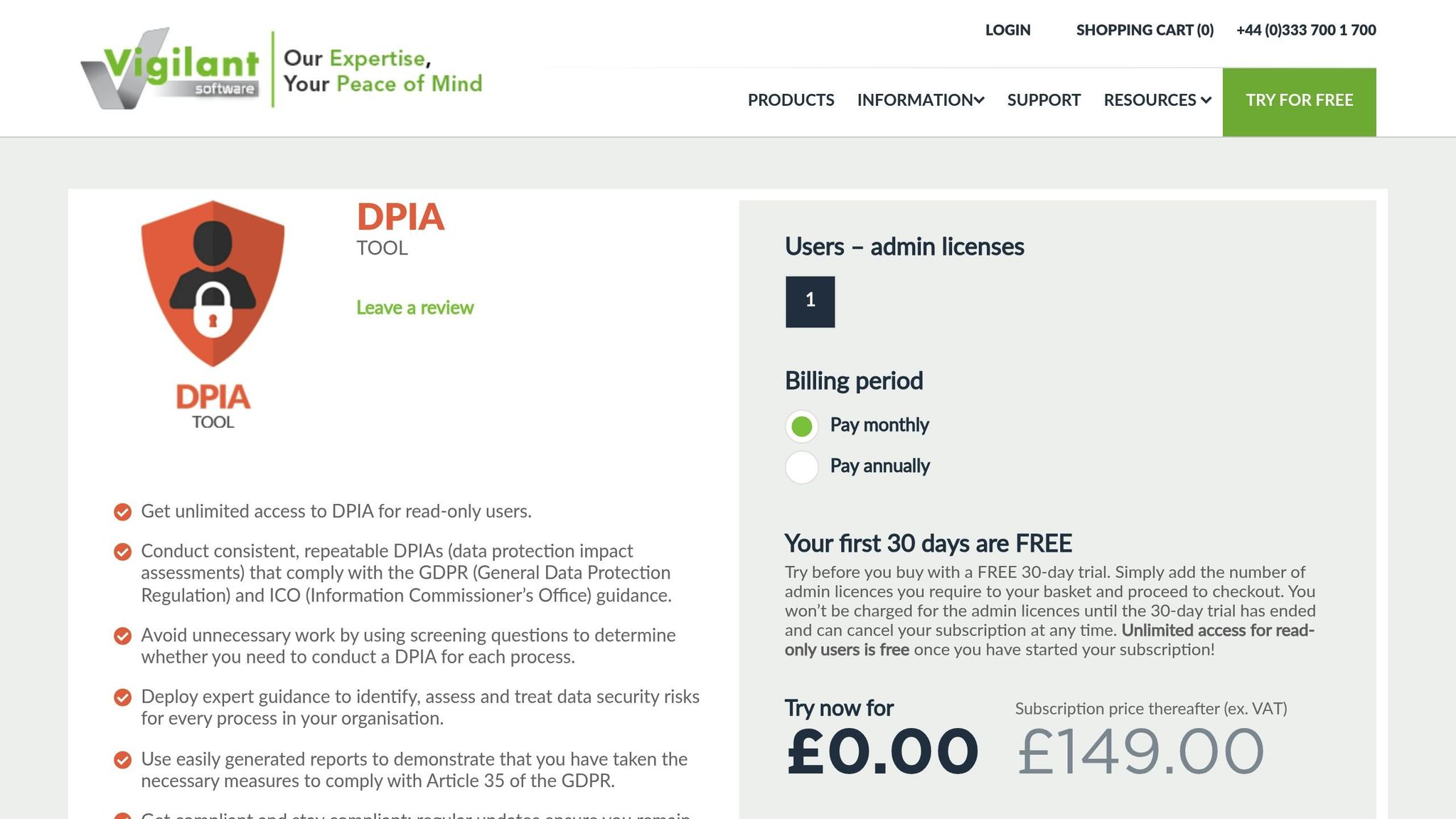
Vigilant Software's DPIA Tool offers a cloud-based solution designed to guide users through a simple, step-by-step Data Protection Impact Assessment (DPIA) process. This structured approach helps organizations achieve effective, collaborative compliance.
The tool simplifies risk management by automating the identification of risks. It uses tailored compliance checklists and ready-to-use documentation templates, eliminating the need for manual evaluations. Users can easily categorize risks based on their impact on individuals' privacy rights.
| Feature Category | Capabilities |
|---|---|
| Risk Management | • Automated risk identification • Compliance checklists • Pre-built templates |
| Collaboration | • Role-based permissions • Shared access controls • Centralized documentation |
| Compliance Support | • GDPR-specific guidance • Tools for ongoing reviews • Audit-ready reporting |
The platform's features are complemented by collaborative controls, allowing compliance officers, IT teams, and legal departments to work together effectively. Its role-based permissions and centralized documentation streamline coordination.
To ensure organizations remain compliant, the tool also supports regular reviews and updates, making it easier to adapt to changing regulations. This makes it particularly beneficial for industries like healthcare, finance, and technology, where regulatory requirements are stringent.
For example, a healthcare provider introducing a new patient data management system can use the tool to assess privacy risks and document mitigation strategies, ensuring adherence to data protection laws.
3. TrustArc Assessment Manager
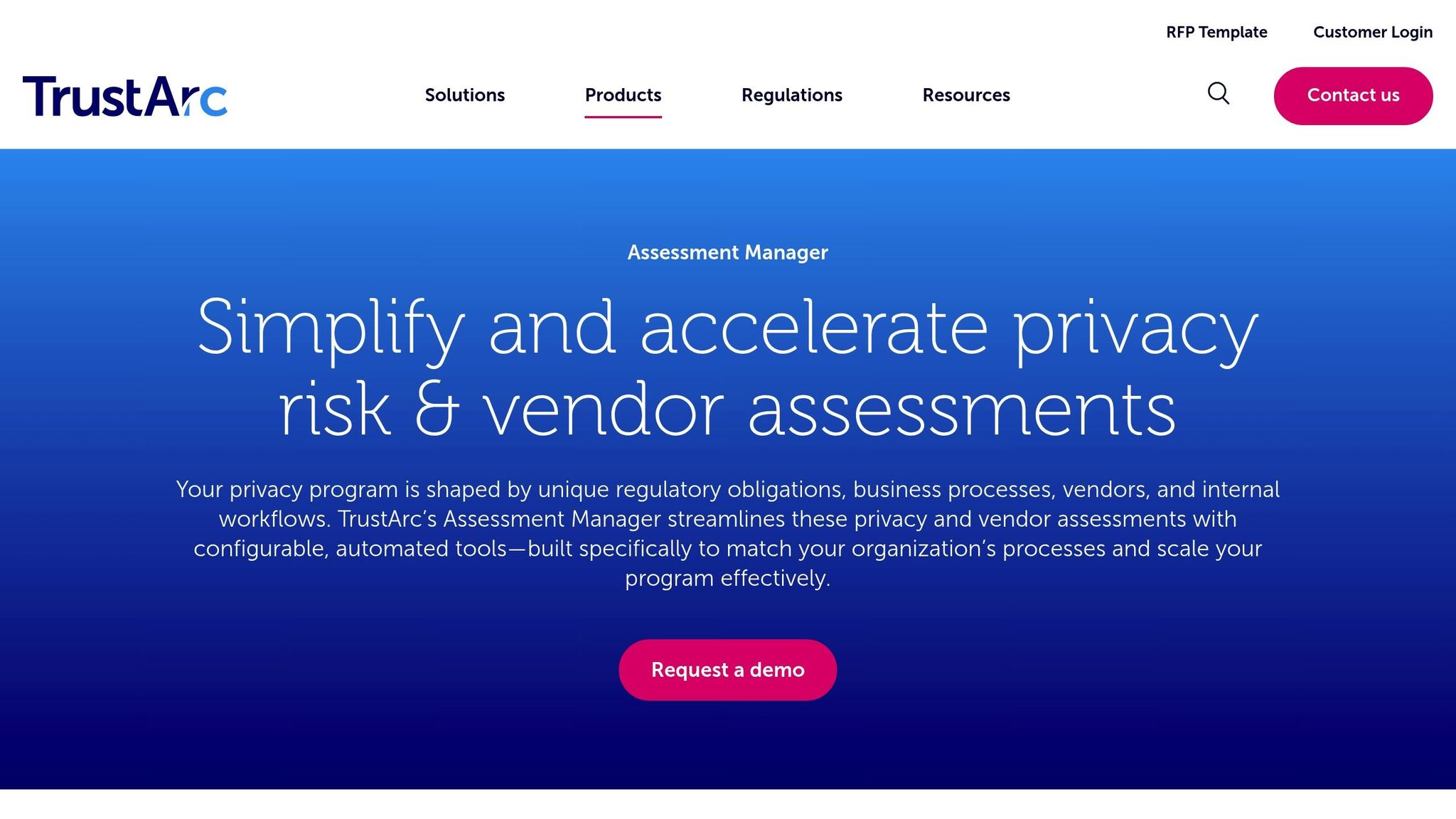
TrustArc Assessment Manager is designed to simplify DPIA (Data Protection Impact Assessment) processes by combining automation with privacy management features. With its structured workflows and customizable templates, it helps organizations navigate the entire assessment process efficiently.
One standout feature is its automated risk scoring, which analyzes data processing activities to quickly identify and evaluate privacy risks. This allows teams to focus on addressing the most pressing issues first.
| Feature Category | Capabilities |
|---|---|
| Assessment Tools | • Customizable templates • Automated risk scoring • Multi-jurisdictional support |
| Workflow Management | • Real-time collaboration • Audit trails • Data flow mapping |
| Compliance Support | • GDPR/CCPA alignment • Regulatory updates • Documentation automation |
These features are designed to integrate smoothly into broader compliance workflows, making it easier for organizations to manage privacy-related tasks.
TrustArc also connects with other systems like GRC (Governance, Risk, and Compliance) tools, security incident management platforms, and business intelligence solutions, creating a unified ecosystem for privacy management.
One example of its effectiveness? A major financial services company reported a 40% reduction in assessment completion time after implementing TrustArc.
Another key benefit is its regulatory intelligence, which ensures templates are updated with the latest global privacy requirements. For businesses operating internationally, TrustArc offers multilingual support and templates tailored to specific jurisdictions - a crucial feature for navigating diverse privacy regulations.
With workflow automation and built-in collaboration tools, TrustArc streamlines the entire DPIA process, from data collection to documentation, saving both time and effort.
4. Securiti AI-Powered Platform
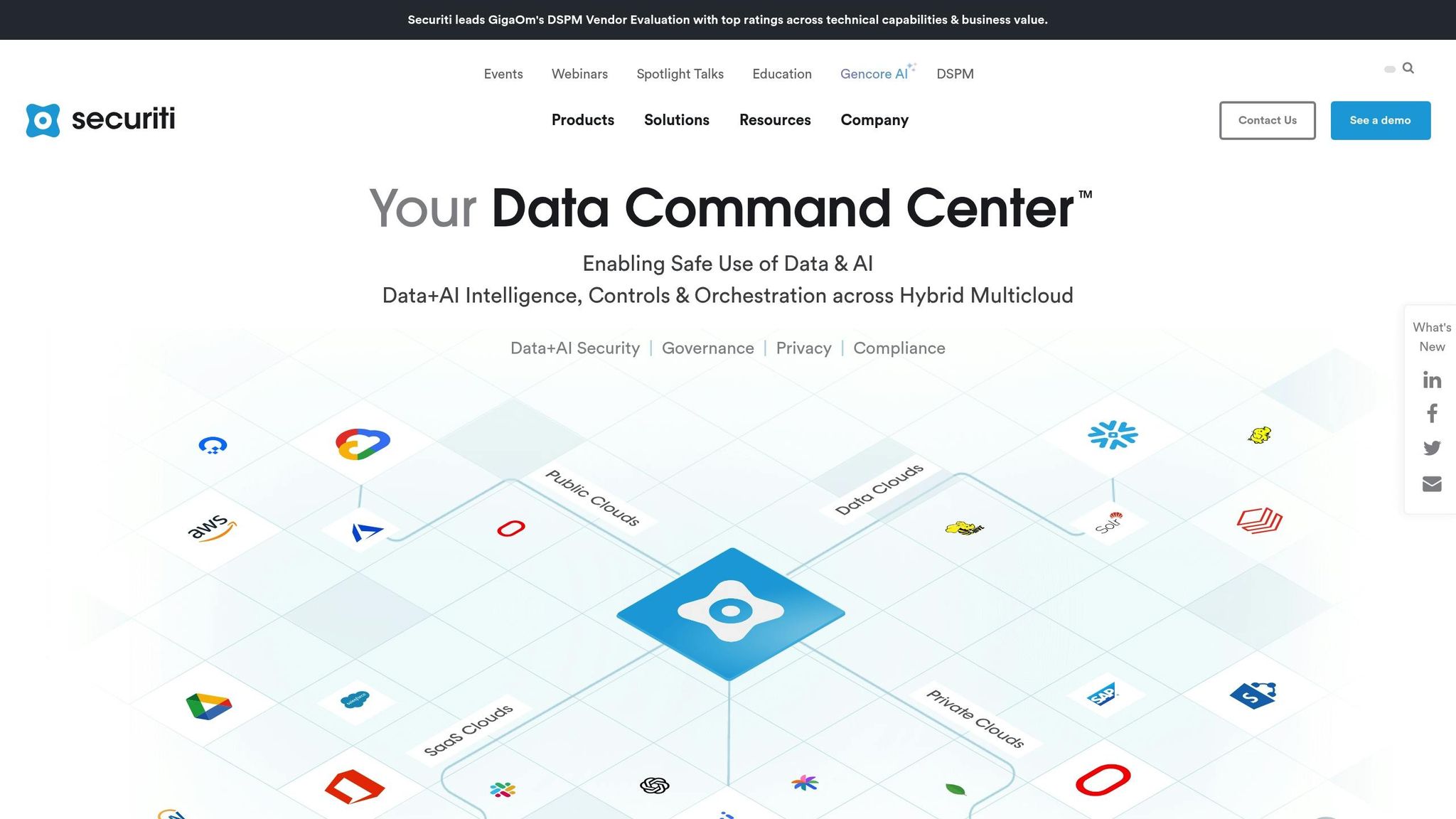
Securiti's AI-powered platform simplifies DPIA (Data Protection Impact Assessment) management by automating data discovery and classification. Its Data Intelligence Engine processes sensitive data across both cloud and on-premises environments, ensuring thorough and efficient analysis.
What sets this platform apart is its machine learning capabilities, which analyze processing activities to identify privacy risks. This approach reduces DPIA completion times by up to 60%.
| Feature | Capability |
|---|---|
| Data Discovery | • Scans over 1,000 data attributes • Real-time data mapping • Automated classification |
| Risk Assessment | • Machine learning for risk identification • Regulatory compliance checks • Automated impact evaluations |
| Compliance Coverage | • Covers 100+ global privacy regulations • Provides industry-specific templates • Multi-language support |
The platform continuously monitors data flows and processing activities, sending real-time alerts about potential privacy risks. This feature is particularly useful in industries like healthcare and finance, where data sensitivity is paramount. Additionally, it integrates seamlessly with templates tailored for specific industries, making compliance more manageable.
Using advanced natural language processing, the platform can analyze privacy policies and data processing agreements, which is especially beneficial for handling complex, enterprise-level data operations. Pricing begins at $25,000 annually.
Securiti's platform has also gained industry recognition for its forward-thinking approach. With regular updates and robust integrations, it helps organizations stay aligned with ever-changing privacy regulations.
sbb-itb-5f36581
5. Clarip Risk Intelligence
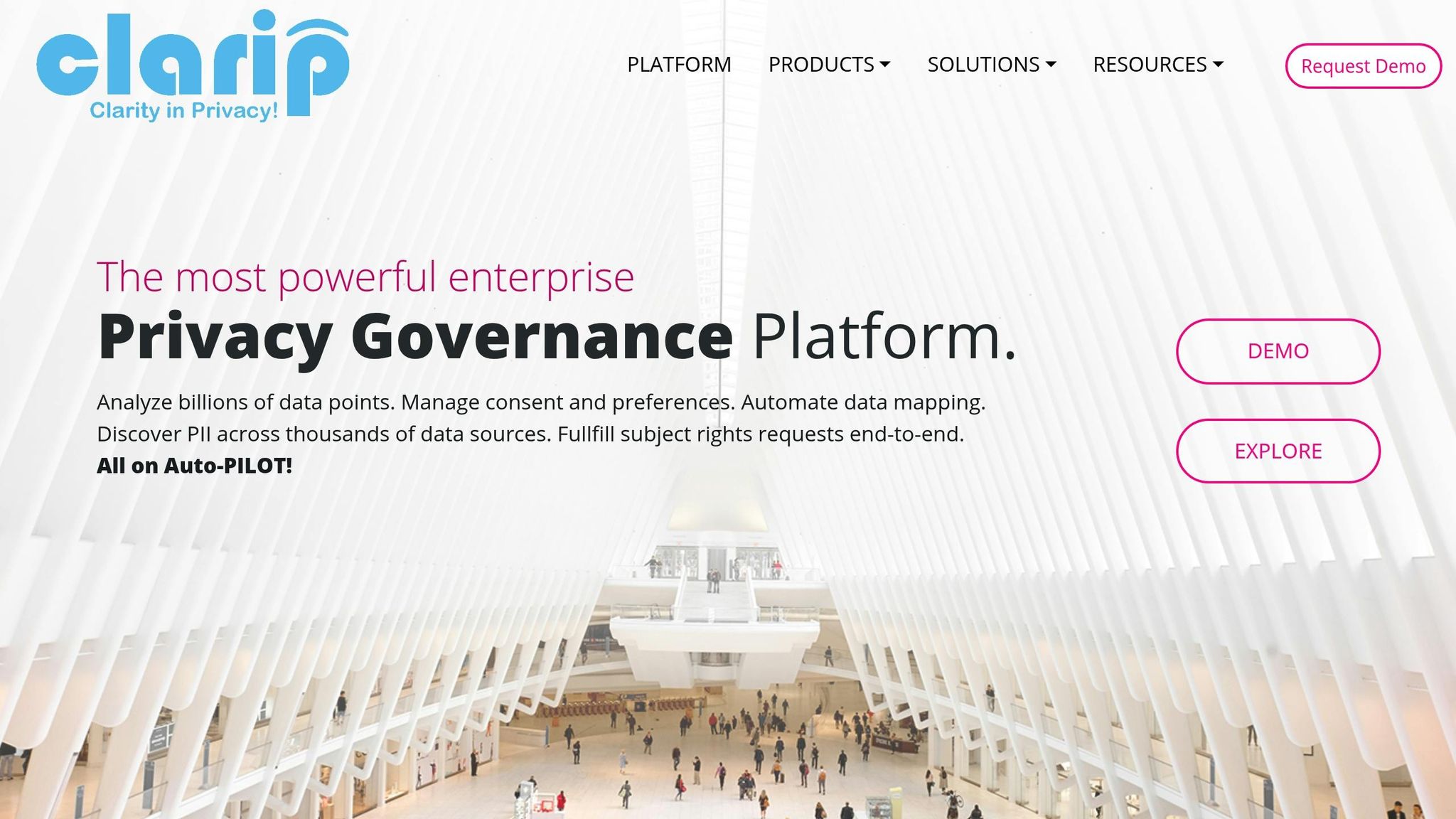
Clarip Risk Intelligence provides an AI-driven DPIA platform designed to assess privacy risks by analyzing over 500 data points across an organization's ecosystem. With automated data discovery and classification at its core, it simplifies and strengthens privacy management.
| Feature Category | Capabilities |
|---|---|
| Risk Analysis | • AI-based risk scoring • Predictive analytics for risk trends • Real-time risk tracking |
| Automation | • Automated data discovery • Smart classification engine • Streamlined assessment workflows |
| Compliance | • Covers 100+ global regulations • Pre-built compliance templates • Vendor risk management tools |
Using Clarip’s automated DPIA tools, organizations report cutting assessment completion times by about 60%. The platform’s dashboard provides a clear view of privacy risks and compliance status, catering to both cloud-based and on-premise deployments to meet diverse security needs.
For pricing, enterprise plans start at approximately $25,000 per year, while small-to-medium business plans are available for around $12,000 annually. Custom pricing options are also offered for businesses with specific requirements.
Clarip enjoys a strong reputation, holding a 4.3/5 rating on G2, thanks to its effective automated analytics and integrated vendor risk management features. These capabilities are especially helpful for industries with strict regulatory demands.
With its automated monitoring, flexible risk scoring, and continuous compliance support, Clarip’s platform is well-suited for organizations navigating today’s complex regulatory environment.
6. Mandatly Compliance Hub
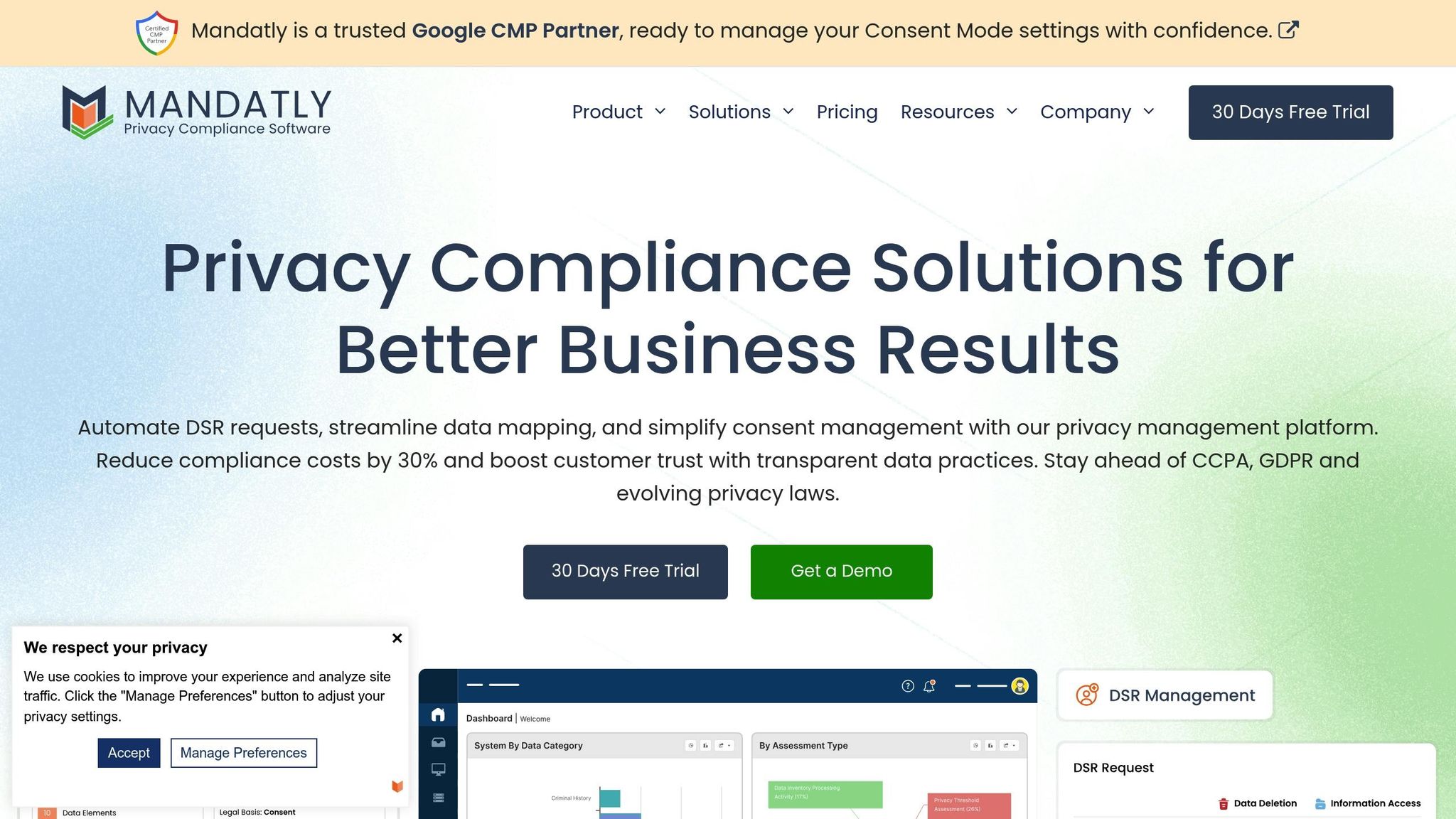
Mandatly offers an automated DPIA solution designed to simplify compliance across multiple jurisdictions. By combining structured workflows with real-time collaboration tools, the platform helps organizations streamline their data protection assessments.
| Feature Category | Capabilities |
|---|---|
| Assessment Tools | • Flexible DPIA templates • Automated risk scoring • Support for multi-jurisdictional compliance |
| Workflow Management | • Real-time collaboration features • Role-based access controls • Automated alert notifications |
| Compliance Coverage | • GDPR alignment • CCPA framework integration • Regular updates to reflect changing regulations |
Mandatly significantly cuts down the time it takes to complete DPIAs. For example, a mid-sized U.S. healthcare provider reported a 40% reduction in assessment time, along with better documentation quality during audits. This blend of efficiency and accuracy demonstrates how the platform merges user-focused design with automated compliance updates.
The platform’s interface is intuitive, offering a centralized dashboard for tracking compliance status and pending tasks. Its built-in regulatory intelligence ensures automatic updates to assessment criteria, keeping organizations aligned with the latest privacy laws.
Mandatly also integrates seamlessly with CRM systems, automatically initiating DPIA processes when new data activities are detected. Security is a top priority, with enterprise-grade features such as encryption (both at rest and in transit), regular audits, and SOC 2 compliance ensuring data remains protected.
The pricing model is subscription-based and adjusts based on business size, offering flexible terms tailored through consultations.
7. Ketch Governance Suite
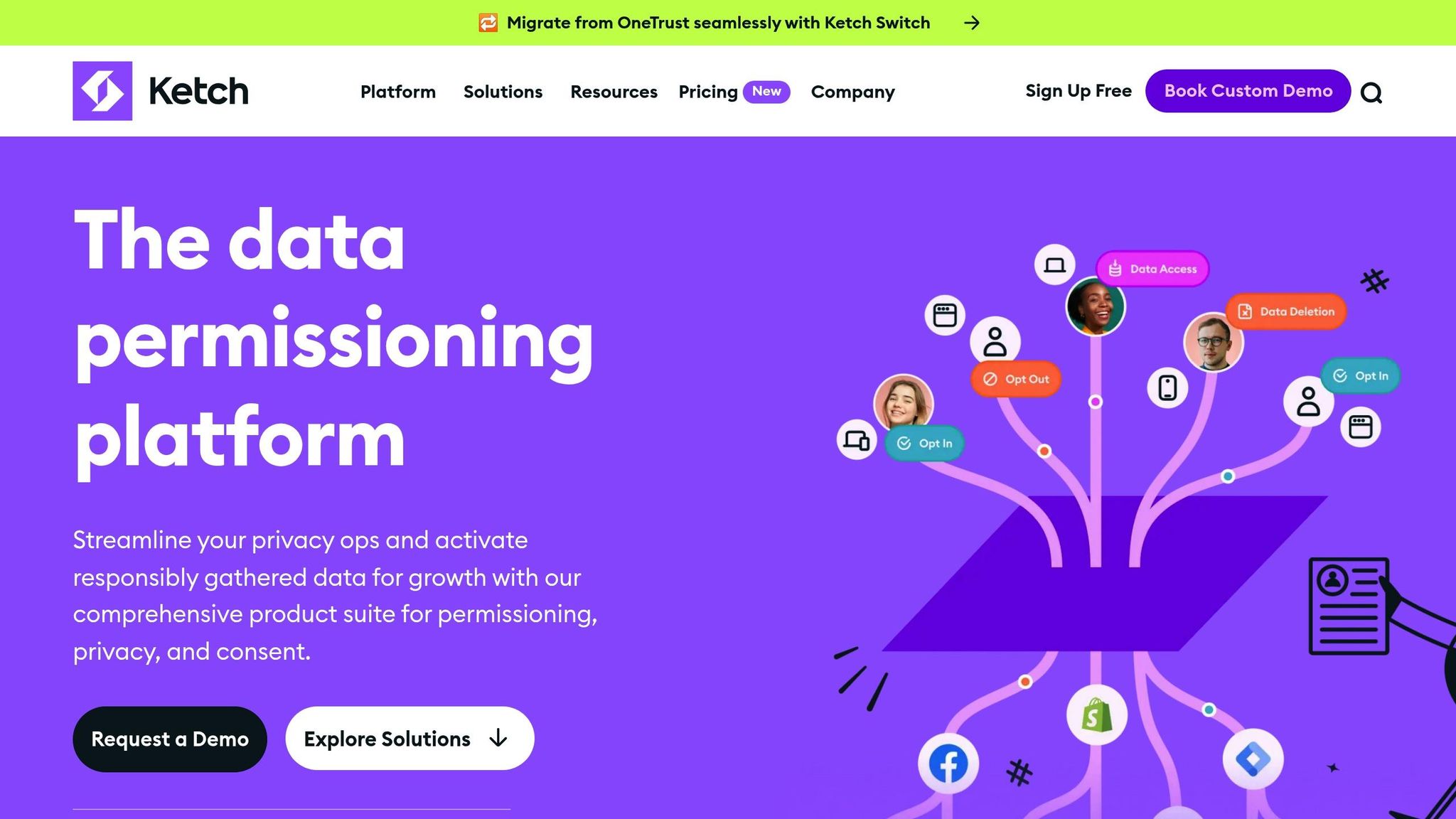
The Ketch Governance Suite stands out by combining AI-powered data mapping with real-time risk assessments, making it a solid choice for organizations managing complex data environments.
| Feature Category | Capabilities |
|---|---|
| Core Functions | • AI-powered risk analysis • Real-time data mapping • Automated documentation • Compliance tracking |
| Integration | • Cloud storage connectors • CRM system integration • Data warehouse compatibility • API accessibility |
| Security | • End-to-end encryption • Role-based access • SOC 2 compliance • Regular security audits |
These features are designed to align effortlessly with existing compliance workflows, enhancing the platform's role as a unified privacy management solution. Early adopters have noted faster assessment completion times and improved documentation accuracy, making it a practical tool for streamlining privacy processes.
Ketch also offers extensive regulatory coverage, supporting compliance with over 30 global privacy laws. The platform includes pre-built templates and frameworks that automatically update to reflect changes in legislation - an invaluable feature for companies operating across multiple regions.
The suite’s unified governance dashboard provides real-time insights into data processing activities. For example, a leading financial services firm reported quicker audit responses and a reduction in compliance incidents thanks to the platform's proactive risk identification capabilities.
Security is a top priority for Ketch. The system uses U.S.-based cloud infrastructure and is ISO 27001 certified. It employs enterprise-grade encryption for data at rest and in transit, ensuring sensitive information is always protected.
Ketch offers flexible pricing through a tiered subscription model, with customizable packages to meet enterprise needs. Its modular design allows businesses to start with essential DPIA tools and expand as their privacy programs grow, making it a scalable option for organizations of all sizes.
DPIA Tools Feature Comparison
This section dives into the key differences in features, pricing, and technical specifications of various DPIA tools, helping businesses determine which solution aligns best with their needs.
Core Features and Compliance Coverage
Here's a breakdown of how these tools stack up in terms of their primary features and compliance capabilities:
| Feature Category | OneTrust (Privacy Automation) | Vigilant Software (DPIA Tool) | TrustArc (Assessment Manager) | Securiti (AI-Powered Platform) | Clarip (Risk Intelligence) | Mandatly (Compliance Hub) | Ketch (Governance Suite) |
|---|---|---|---|---|---|---|---|
| Risk Assessment | Step-by-step approach | Guided risk identification | Comprehensive risk assessment | AI-powered risk identification | Advanced risk mapping | Integrated approach | Automated risk scoring |
| Automation Level | High automation | Moderate automation | High automation | High automation with AI assistance | Moderate automation | High automation | High automation |
| Compliance Coverage | Extensive, multi-jurisdictional support | Primarily GDPR-focused | Broad global support | Robust international compliance | Focused on major regulations | Broad compliance support | More limited coverage |
| Data Mapping | Automated | Manual or guided mapping | Automated | AI-assisted data mapping | Semi-automated mapping | Automated mapping | AI-assisted mapping |
| Vendor Assessment | Advanced | Basic | Advanced | Advanced | Basic | Intermediate | Advanced |
This table clearly illustrates the range of capabilities, from automation levels to compliance coverage, catering to businesses with different priorities.
Integration and Technical Capabilities
When it comes to integration, tools like TrustArc's Assessment Manager stand out for their ability to connect seamlessly with a variety of data sources. On the other hand, Vigilant Software focuses more narrowly on GDPR compliance, offering a streamlined but less versatile integration experience.
Pricing and Value Proposition
The pricing for these tools generally falls into three categories:
- Enterprise Solutions - Custom pricing tailored to large organizations with complex needs.
- Mid-Market Options - Flexible pricing models for medium-sized businesses.
- SMB-Focused Solutions - Affordable options designed for smaller businesses.
Each pricing tier reflects the level of functionality and scalability offered, making it important to match the tool to your organization's size and budget.
User Experience and Implementation
The ease of use and setup process varies significantly across these platforms:
- Vigilant Software offers a straightforward, cloud-based interface that allows for quick deployment.
- Enterprise-level tools like OneTrust and TrustArc provide a wealth of features but often require extensive training for effective implementation.
- Other platforms strike a balance, offering user-friendly interfaces while maintaining robust functionality.
These differences in user experience are critical for organizations seeking a tool that aligns with their technical expertise and operational needs.
Automation and AI Capabilities
The level of automation and use of AI is another area where these tools differ. For instance:
- Securiti leads with its ability to automate risk identification and data mapping using AI.
- Vigilant Software emphasizes a more hands-on approach with guided manual assessments, supplemented by basic automation.
Such variations can influence how efficiently an organization can manage its privacy and compliance workflows.
Security and Compliance Standards
Security features are a cornerstone of these tools, particularly for enterprise-grade solutions. They typically include:
- Strong encryption protocols
- Advanced access control mechanisms
- Compliance with industry certifications
These safeguards ensure that sensitive data remains protected, but it's crucial for businesses to evaluate how well these measures align with their specific security requirements.
Key Points and Recommendations
When choosing a DPIA tool in 2025, it's essential to find one that aligns with your specific needs and fully addresses compliance requirements.
Business Size Considerations
For small and medium-sized businesses, tools with guided workflows and user-friendly interfaces are a smart choice. For example, Vigilant Software DPIA Tool is a great option for those just starting out. On the other hand, enterprises dealing with complex data environments should consider platforms like OneTrust Privacy Automation or TrustArc Assessment Manager, which offer advanced integration options and scalability.
Essential Features to Prioritize
| Feature Category | Priority Level | Key Considerations |
|---|---|---|
| Risk Assessment | Critical | Opt for tools that provide step-by-step guidance and thorough risk identification. |
| Automation | High | Choose a tool that matches your team’s technical expertise to streamline processes. |
| Compliance Updates | Critical | Ensure the tool automatically adapts to regulatory changes. |
| Integration Capabilities | Medium to High | Verify compatibility with your current technology stack. |
| Reporting Tools | High | Look for customizable dashboards and reports ready for stakeholders. |
Once you've identified the features that matter most, evaluate the tool's overall value and how it fits within your budget.
Cost-Effectiveness Strategy
DPIA tools often prove more affordable than hiring external GDPR consultants. When assessing costs, consider:
- Implementation Timeline - Account for training and setup expenses.
- Maintenance Requirements - Be aware of ongoing support and update fees.
- Scalability Options - Ensure the pricing structure can grow with your business.
- Automation Savings - Estimate how much time and money automation could save your team.
Implementation Best Practices
After narrowing down your options, focus on successful deployment:
- Conduct a trial run targeting high-priority data processing activities.
- Establish clear workflows and document every DPIA decision.
- Keep detailed records of outcomes for compliance and future reference.
Future-Proofing Your Choice
To stay ahead of regulatory changes, prioritize cloud-based tools that update automatically. Platforms with AI-driven features can enhance risk identification and assessment, making them a valuable long-term investment. Consider factors such as your regulatory focus, company size, integration needs, and budget. Gathering user feedback and testing top tools will help ensure you make the right choice.
Technical Integration Considerations
Make sure the tool integrates seamlessly with your existing systems, including:
- Data management platforms
- Security infrastructure
- Compliance monitoring tools
- Reporting systems
FAQs
What should I look for in a Data Protection Impact Assessment (DPIA) tool in 2025?
When you're picking a DPIA tool in 2025, look for one that emphasizes ease of use, flexibility, and scalability to align with your organization’s specific needs. The right tool should simplify your processes, help maintain compliance, and provide actionable insights.
Here are some key features to consider:
- Intuitive interface that makes it easy for teams to get started quickly.
- Customizable options to adapt forms and assessments to your requirements.
- Real-time analytics for monitoring performance and making data-driven decisions.
- Smooth integrations with your current CRM and marketing platforms.
By selecting a tool with these features, you can streamline your data protection efforts, enhance operational efficiency, and stay on top of privacy regulations.
How do automation and AI features improve the efficiency of DPIA tools for privacy compliance?
Automation and AI bring a whole new level of efficiency to DPIA tools by simplifying complicated processes and cutting down on manual work. These technologies can quickly pinpoint potential privacy risks, sift through massive datasets to spot compliance issues, and offer practical recommendations - all while saving time and resources.
What’s more, AI-driven tools can keep up with changing regulations, ensuring that your assessments stay current. With features like predictive analytics and intelligent workflows, organizations can handle privacy risks more effectively and stay compliant without causing major interruptions to their day-to-day operations.
How does the cost of using a DPIA tool compare to hiring external GDPR consultants?
The cost of a Data Protection Impact Assessment (DPIA) tool can vary based on its pricing structure. Some tools operate on a monthly subscription model, while others charge a one-time fee. These tools are built to simplify the DPIA process, cutting down on manual effort and saving time, which can make them a practical choice for many businesses.
In contrast, hiring external GDPR consultants often comes with higher upfront costs due to their specialized expertise and hourly rates. That said, consultants can offer personalized guidance and tackle complex scenarios that might be beyond what a tool can handle. Deciding between the two options depends on your organization's budget, specific needs, and the intricacy of your data protection challenges.
Related posts
Get new content delivered straight to your inbox

The Response
Updates on the Reform platform, insights on optimizing conversion rates, and tips to craft forms that convert.
Drive real results with form optimizations
Tested across hundreds of experiments, our strategies deliver a 215% lift in qualified leads for B2B and SaaS companies.


.webp)


